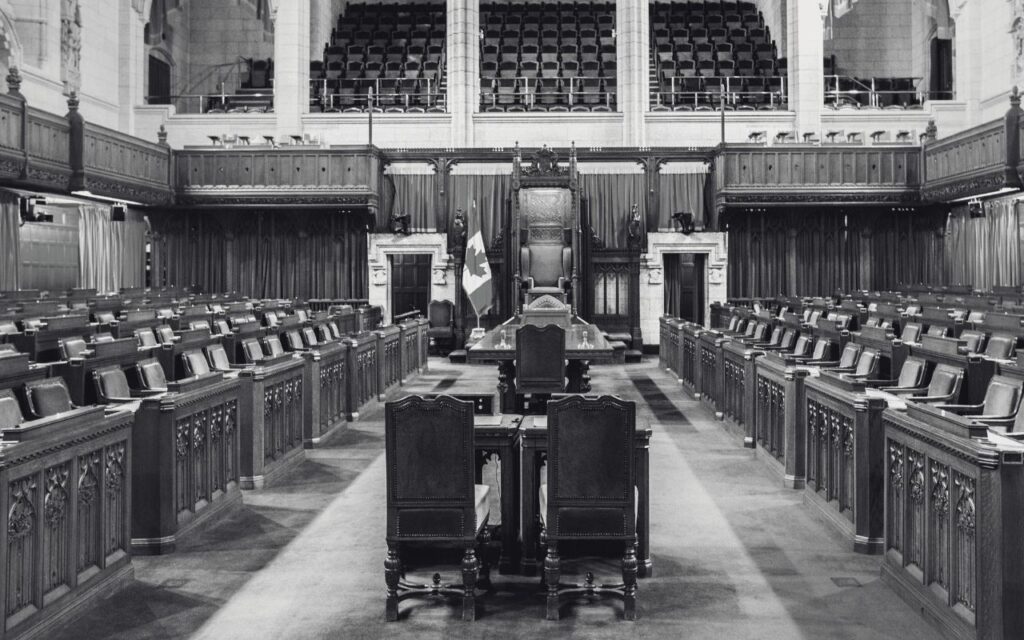
Once a global leader in women’s political representation, Canada now ranks 71st in the world – a startling drop from 28th just 25 years ago. While other nations have introduced bold measures to close the gender gap in politics, Canada has quietly fallen behind.
We sat down with Shari Graydon, of Informed Perspectives, an organization dedicated to bridging the gender gap in public discourse and decision-making conversations, to unpack what this decline means for democracy, how other countries are getting it right, and what it will take to put Canada back on the path to parity.

THT: Canada has fallen from around 28th in the world 25 years ago to 71st today. What was your initial reaction when you heard that?
Shari Graydon: Honestly, my first reaction was disbelief. I thought, “That can’t be right.” But then I saw the rankings myself – and there we were, behind countries I expected, like those in Northern Europe, but also behind many in South and Central America.
That was a real wake-up call. We started working with academic researchers to understand the strategies other countries have used to increase women’s representation in their parliaments. And the more I learned, the more frustrated I became with our complacency here in Canada.
For too long, there’s been this quiet acceptance that 28 per cent or even 30 per cent female representation is “good enough.” But it’s not. Other countries have recognized that representation is fundamental to democracy. We are half the population – we deserve equal representation.
Our work has really focused on learning from those countries and drawing attention to the gap here at home. We shouldn’t be satisfied with the status quo.
THT: I really appreciate how you frame that – it’s not about what Canada is actively doing to block women, but about the actions we’re not taking to help them get there. What have you learned from countries that are leading the way?
Shari Graydon: A great example is Mexico. When people think of Mexico, they often picture a deeply Catholic, traditional culture. So learning that Mexico ranks fourth in the world was a surprise even to me.
The reason they’re fourth is simple but powerful: they rewrote their constitution to state that women, as half the population, deserve equitable representation. It didn’t happen overnight, but today, 50 per cent of their federal legislature is made up of women.
I’m not suggesting Canada is on the verge of constitutional reform – that’s not realistic here. But Mexico is one of more than 100 countries that have adopted some form of gender quota.
When I first learned about quotas, I had the same reaction many Canadians do: the idea that quotas are “the enemy of merit.” But the data tells a very different story. More than half of the countries in the Inter-Parliamentary Union’s review have implemented quotas, and the impact has been significant.
One of my favourite examples comes from Sweden. Researchers studied the qualifications of elected politicians before and after gender quotas were introduced at the municipal level. What they found was fascinating: after quotas were imposed, the qualifications of elected officials went up.
Why? Because parties didn’t remove their star male candidates, they went out and found equally qualified women. The result was stronger overall candidates and better representation.
That kind of evidence is hard to ignore. It’s made me much more impatient with the assumption that Canada can coast on its reputation as a progressive country. If we want change, we have to take deliberate action.
THT: As someone who’s spent years working to uplift women’s voices, when you look at Canada’s declining ranking and the lack of urgency around it, what worries you most about women’s representation in Parliament?
Shari Graydon: We now have about 30 years of research showing the impact of diversity – broadly, but also specifically when it comes to women. If you’re governing on behalf of the entire population and making decisions on health, the economy, or climate policy, you need that diversity of perspective.
Different lived experiences shape how people approach problems and propose solutions. So when women aren’t equitably represented at decision-making tables, we’re making decisions with blind spots. That’s not just a gender issue – it’s a risk to our country’s competitiveness, innovation, and resilience.
This isn’t to say there aren’t many smart, capable men in politics – of course, there are. But the data is unequivocal: diversity strengthens decision-making. And at a time when global challenges – from economic instability to climate change – are intensifying, being 71st in the world on this metric means we’re less equipped to lead and compete.
THT: Another piece of this conversation is how the political landscape itself has changed. I’ve spoken to several women who’ve stepped away from politics because of the hate, vitriol, and even danger they face. There’s also a question of safety, right?
Shari Graydon: Absolutely. This comes up in every conversation. Look at Catherine McKenna, for example – when she launched her book recently, she spoke openly about the brutal attacks she endured while in office.
What’s interesting is that research suggests when more women are in these deliberative spaces, the tenor of debate actually improves. Women are often socialized to be more respectful and collaborative, which can help lower the temperature in these conversations.
And leadership matters – when prominent figures model civility, it influences how the broader public engages. We’ve seen the opposite effect too: inflammatory rhetoric from political leaders, both in the U.S. and here in Canada, emboldens people to engage in more aggressive, harmful attacks. Representation isn’t just about numbers – it can literally change the tone of our politics.
THT: So here’s the big question: How do we fix this? For everyday people – women who aren’t in politics but care about representation – what can we actually do?
Shari Graydon: One tangible way is through the Balance the Power campaign. We created a website with a map of Canada showing how provinces and political parties are doing when it comes to gender representation.
We also built an easy tool: you can enter your postal code, adapt a draft message, and, with one click, send an email to your municipal, provincial, and federal representatives. It’s a way to say, “This matters. As your constituent, I want to see you commit to making Canada more democratic and representative.”
I know many people have fallen out of the habit of contacting their politicians, but numbers really do matter. When 10, 20, or 30 constituents raise the same issue, it gets attention. So for anyone who cares about this, that’s a meaningful place to start.
THT: My final question for you today – I know a lot of this has focused on the negative, on what we’re not doing and how we’re falling behind. But in all of that you’ve shared, what brings you hope when you look at the future?
Shari Graydon: I find hope from the conversations I have with individual Canadians – men and women across the country – who are similarly shocked and appalled. In the polling research we did, we found that 86 per cent of Canadians believe women should hold a balance of power. That’s overwhelming support for gender parity, and I find hope in that expectation.
When I was in Ottawa during Gender Equality Week, I met with politicians across partisan lines. I heard from women politicians from every side of the spectrum that their experience within their own parties sometimes left them feeling their voices were marginalized. Although that might not sound hopeful, to me it is, because it means this is now a broadly recognized problem.
And lastly, conversations like this. Knowing there are people out there who are concerned about this, working on it, and pushing us to be better, well, that brings me hope.








